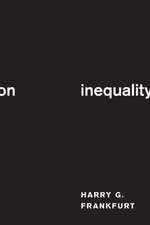Robert Nozick
Autor A. R. Laceyen Limba Engleză Paperback – 30 iun 2001
Preț: 348.59 lei
Nou
Puncte Express: 523
Preț estimativ în valută:
66.70€ • 69.83$ • 55.19£
66.70€ • 69.83$ • 55.19£
Carte tipărită la comandă
Livrare economică 05-19 aprilie
Preluare comenzi: 021 569.72.76
Specificații
ISBN-13: 9780691090450
ISBN-10: 0691090459
Pagini: 224
Dimensiuni: 140 x 217 x 14 mm
Greutate: 0.33 kg
Editura: Princeton University Press
Locul publicării:Princeton, United States
ISBN-10: 0691090459
Pagini: 224
Dimensiuni: 140 x 217 x 14 mm
Greutate: 0.33 kg
Editura: Princeton University Press
Locul publicării:Princeton, United States
Cuprins
Preface Vii
Chapter 1: Introduction 1
Introduction: analytic philosophy, 1
Changes of interest, 5
Nozick's change of approach: proof and explanation, 6
Coercion, 8
Explanation and understanding, 12
Truth and the aim of philosophy, 14
The unity of Nozick's philosophy, 17
Summary, 19
Chapter 2: Anarchy, State, and Utopia: the moral basis 20
Introduction, 20
The role of the individual, 23
The basis of rights, 25
Animals and angels, 28
Welfarist criticisms of Nozick, 30
Libertarian criticisms of Nozick, 32
The nature of rights, 34
The theory of justice 1: justice in transfer, 37
Blurring the distinction, 40
The theory of justice 11: justice in acquisition and Locke's proviso, 42
The theory of justice 111: rectification and compensation, 44
Nozick on Rawls, 48
Summary, 50
Chapter 3: Anarchy, State, and Utopia: the political outcome 52
Introduction, 52
Explaining and justifying: the program, 54
The execution 1: the state of nature, 57
The execution 11: growth of the state, 59
Practical objections, 60
Objections of principle 1: transitivity and compensation, 62
Objections of principle 11: procedural rights and incomplete knowledge, 65
Utopia l: the framework, 66
Utopia II: objections, 68
Summary, 71
Chapter 4: The later ethics and politics 73
Introduction, 73
Ethics and motivation, 74
Value as organic unity, 78
Value and disvalue, 81
Organic unity as value, 82
Some criticisms, 83
The basis of value, 85
The ethical pull, 88
Deontology and teleology: rights, 89
The islought question, 92
Political implications: symbolic utility, 95
Summary, 98
Chapter 5: Epistemology 100Introduction: internalism and externalism, 100
Outline of Nozick's theory, 102
Counterfactuals, 104
Scepticism and closure, 108
The price that Nozick pays, 111
Some criticisms of Nozich, 114
Internalism and externalism again, 122
Evidence, 125
Summary, 130Chapter 6: Rationality 133Introduction: rationality in general, 133
Principles and their uses, 135
Practical rationality in the dissertation, 140
Decision theory 1: the first two discussions, 142
Decision theory 11: the third discussion, 146
Decision theory 111: symbolic utility again, 149
Belief and acceptance, 151
Evolution and its role, 153
Types and limits of rationality, 156
Summary, 158Chapter 7: Metaphysics I: personal identity 160Introduction: identity in general, 160
Nozick's theory, 161
Personal identity 1: general considerations, 163
Personal identity 11: ties and caring, 166
Personal identity 111: closeness, 168
Interlude: the unity of Nozieh's philosophy, 170
Personal identity IV: the nature of the self, 172
Summary, 175
Chapter 8: Metaphysics II: explaining existence 177
Introduction: "Why is there something rather than nothing?"; 177
Nozick's approach, 178
Fecundity, 181
Self-subsumption, 182
Limited fecundity, 183
Wedin's criticisms, 185
Summary, 186Chapter 9: Metaphysics III: free will and retribution 188Introduction, 188
The indeterministic approach, 189
Tracking again, 191
Retribution, 193
Summary, 197Chapter 10: The meaning of life 199Introduction: conditions for meaningfulness, 199
Ein Sof and its problems, 201
Self-subsumption again, 203
The dialectic of meaning and value, 205
Conclusion: philosophy and the arts and sciences, 206
Summary, 208
Guide to further reading 209
Bibliography 221
Index 235
Chapter 1: Introduction 1
Introduction: analytic philosophy, 1
Changes of interest, 5
Nozick's change of approach: proof and explanation, 6
Coercion, 8
Explanation and understanding, 12
Truth and the aim of philosophy, 14
The unity of Nozick's philosophy, 17
Summary, 19
Chapter 2: Anarchy, State, and Utopia: the moral basis 20
Introduction, 20
The role of the individual, 23
The basis of rights, 25
Animals and angels, 28
Welfarist criticisms of Nozick, 30
Libertarian criticisms of Nozick, 32
The nature of rights, 34
The theory of justice 1: justice in transfer, 37
Blurring the distinction, 40
The theory of justice 11: justice in acquisition and Locke's proviso, 42
The theory of justice 111: rectification and compensation, 44
Nozick on Rawls, 48
Summary, 50
Chapter 3: Anarchy, State, and Utopia: the political outcome 52
Introduction, 52
Explaining and justifying: the program, 54
The execution 1: the state of nature, 57
The execution 11: growth of the state, 59
Practical objections, 60
Objections of principle 1: transitivity and compensation, 62
Objections of principle 11: procedural rights and incomplete knowledge, 65
Utopia l: the framework, 66
Utopia II: objections, 68
Summary, 71
Chapter 4: The later ethics and politics 73
Introduction, 73
Ethics and motivation, 74
Value as organic unity, 78
Value and disvalue, 81
Organic unity as value, 82
Some criticisms, 83
The basis of value, 85
The ethical pull, 88
Deontology and teleology: rights, 89
The islought question, 92
Political implications: symbolic utility, 95
Summary, 98
Chapter 5: Epistemology 100Introduction: internalism and externalism, 100
Outline of Nozick's theory, 102
Counterfactuals, 104
Scepticism and closure, 108
The price that Nozick pays, 111
Some criticisms of Nozich, 114
Internalism and externalism again, 122
Evidence, 125
Summary, 130Chapter 6: Rationality 133Introduction: rationality in general, 133
Principles and their uses, 135
Practical rationality in the dissertation, 140
Decision theory 1: the first two discussions, 142
Decision theory 11: the third discussion, 146
Decision theory 111: symbolic utility again, 149
Belief and acceptance, 151
Evolution and its role, 153
Types and limits of rationality, 156
Summary, 158Chapter 7: Metaphysics I: personal identity 160Introduction: identity in general, 160
Nozick's theory, 161
Personal identity 1: general considerations, 163
Personal identity 11: ties and caring, 166
Personal identity 111: closeness, 168
Interlude: the unity of Nozieh's philosophy, 170
Personal identity IV: the nature of the self, 172
Summary, 175
Chapter 8: Metaphysics II: explaining existence 177
Introduction: "Why is there something rather than nothing?"; 177
Nozick's approach, 178
Fecundity, 181
Self-subsumption, 182
Limited fecundity, 183
Wedin's criticisms, 185
Summary, 186Chapter 9: Metaphysics III: free will and retribution 188Introduction, 188
The indeterministic approach, 189
Tracking again, 191
Retribution, 193
Summary, 197Chapter 10: The meaning of life 199Introduction: conditions for meaningfulness, 199
Ein Sof and its problems, 201
Self-subsumption again, 203
The dialectic of meaning and value, 205
Conclusion: philosophy and the arts and sciences, 206
Summary, 208
Guide to further reading 209
Bibliography 221
Index 235
Textul de pe ultima copertă
"This book offers an extremely well done, detailed critical survey of Nozick's philosophical writings and reactions to them. I greatly enjoyed reading it."--Gilbert Harman, Princeton University
"This is a good book. It is clear and well written. I wanted to get an overview of Nozick's philosophy, and the author did not disappoint. I don't know of anything else in the field that does what this book does for those who want an introduction to, or overview of, the writings of Robert Nozick."--Scott Arnold, University of Alabama at Birmingham
Recenzii
[A] commendably concise overview of Nozick's philosophical writings. . . . [It] represents an attempt to summarize the main arguments advanced by Nozick throughout his philosophical career, while also discussing the major criticisms those arguments have received. Given the breadth of Nozick'' academic interests, this represents a formidable undertaking; Lacey, however, rises admirably to the task, moving smoothly and knowledgeably between topics as diverse a the moral basis of the state, the metaphysics of personal identity, and spiritual approaches to the meaning of life. This is a well-written book.
"[A] commendably concise overview of Nozick's philosophical writings... [It] represents an attempt to summarize the main arguments advanced by Nozick throughout his philosophical career, while also discussing the major criticisms those arguments have received. Given the breadth of Nozick" academic interests, this represents a formidable undertaking; Lacey, however, rises admirably to the task, moving smoothly and knowledgeably between topics as diverse a the moral basis of the state, the metaphysics of personal identity, and spiritual approaches to the meaning of life. This is a well-written book."--Jonathan Crowe, Policy
"[A] commendably concise overview of Nozick's philosophical writings... [It] represents an attempt to summarize the main arguments advanced by Nozick throughout his philosophical career, while also discussing the major criticisms those arguments have received. Given the breadth of Nozick" academic interests, this represents a formidable undertaking; Lacey, however, rises admirably to the task, moving smoothly and knowledgeably between topics as diverse a the moral basis of the state, the metaphysics of personal identity, and spiritual approaches to the meaning of life. This is a well-written book."--Jonathan Crowe, Policy
















